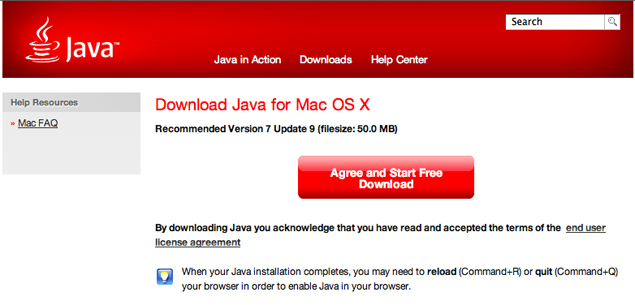Apple removes Java plugin from OS X browsers
Advertisement

Mac users may have noticed that Java-based websites are displaying a "Missing Plug-in" notification. That's because the latest update for Lion and Mountain Lion removes Apple's own Java applet plugin from all browsers. In order to access content on such sites, users are now directed towards the Oracle site to manually download the plugin.
The Apple Support page states that this update is for OS X 10.7 and later. Apart from stripping browsers of the Java plug-in, it also removes the Java Preferences application, since it is no longer required for applet setting configuration. Just to be clear, the update does not remove Java from your system if its installed, just the Java plugin from your web browsers.
This is the latest step in Apple's "crackdown" on Java. Previously, Apple stopped including pre-installed version of Java with Macs (starting with Lion), and then later released an update that disabled Java if it hadn't been used in a certain period of time.
Java and OS X have had a strange relationship, with Apple preferring to release its own version of Java for OS X, instead of letting users download the Sun/ Oracle provided version, as on other platforms like Windows. Due to this, Apple has often been criticised for failing to fix bugs in its Java version.
As experts have noted, if you choose to install the plugin, you'll also need to install Oracle-provided Java, in parallel with Apple's own Java (if already installed), but that's something you needn't worry about as the end user. Just follow the instructions on the page if you need Java up and running with your Mac browsers.
In April this year, Apple came under the scanner for Flashback malware that threatened OS X users by exploiting a vulnerability in Java. Dubbed as a BackDoor.Flashback.39 Trojan, the virus attacked over half-a-million computers. The company was therefore, forced to release a second software update for Lion 10.7 to solve the problem.
Java has attracted plenty of criticism in the past owing to its vulnerable nature forcing Oracle to address the issue. Oracle took the issue seriously and in August the company claimed to have repaired bugs in the Java software, with security firm Rapid7 confirming that the update appeared to have fixed the flaw.
The Apple Support page states that this update is for OS X 10.7 and later. Apart from stripping browsers of the Java plug-in, it also removes the Java Preferences application, since it is no longer required for applet setting configuration. Just to be clear, the update does not remove Java from your system if its installed, just the Java plugin from your web browsers.
This is the latest step in Apple's "crackdown" on Java. Previously, Apple stopped including pre-installed version of Java with Macs (starting with Lion), and then later released an update that disabled Java if it hadn't been used in a certain period of time.
Java and OS X have had a strange relationship, with Apple preferring to release its own version of Java for OS X, instead of letting users download the Sun/ Oracle provided version, as on other platforms like Windows. Due to this, Apple has often been criticised for failing to fix bugs in its Java version.
As experts have noted, if you choose to install the plugin, you'll also need to install Oracle-provided Java, in parallel with Apple's own Java (if already installed), but that's something you needn't worry about as the end user. Just follow the instructions on the page if you need Java up and running with your Mac browsers.
In April this year, Apple came under the scanner for Flashback malware that threatened OS X users by exploiting a vulnerability in Java. Dubbed as a BackDoor.Flashback.39 Trojan, the virus attacked over half-a-million computers. The company was therefore, forced to release a second software update for Lion 10.7 to solve the problem.
Java has attracted plenty of criticism in the past owing to its vulnerable nature forcing Oracle to address the issue. Oracle took the issue seriously and in August the company claimed to have repaired bugs in the Java software, with security firm Rapid7 confirming that the update appeared to have fixed the flaw.
For the latest tech news and reviews, follow Gadgets 360 on X, Facebook, WhatsApp, Threads and Google News. For the latest videos on gadgets and tech, subscribe to our YouTube channel. If you want to know everything about top influencers, follow our in-house Who'sThat360 on Instagram and YouTube.
Advertisement
